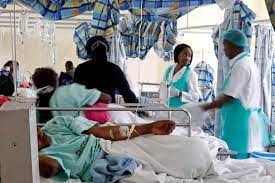EXCLUSIVE: Why Tinubu, staggered, tripped in Ankara
January 28, 2026PAG Calls for Active Voter Participation Ahead of 2027 Elections
January 25, 2026NCDC Alerts On Cholera Outbreak As Nigeria Records 30 Deaths, 1,141 Suspected Cases
NCDC Alerts On Cholera Outbreak As Nigeria Records 30 Deaths, 1,141 Suspected Cases

The Nigeria Centre for Disease Control and Prevention (NCDC) has alerted on increasing cholera cases nationwide, with 30 deaths, 1,141 suspected cases, and 65 confirmed cases reported.
Disclosing this in a public advisory, the Director-General of the Centre, Dr Jide Idris, said the cases that occurred between January and June 11, 2024, were reported from 96 LGAs in 30 states. He stated that the 10 states that contributed 90 percent to the burden of cholera include Bayelsa, Zamfara, Abia, Cross River, Bauchi, Delta, Katsina, Imo, Nasarawa, and Lagos States.
He urged Nigerians to be wary of the increasing trend of cholera cases across the country as the rainy season intensifies.
“An outbreak in Lagos State has recently been reported. From the 1st of January to the 11th of June 2024, a total of 1,141 suspected and 65 confirmed cases of cholera with 30 deaths have been reported from 96 LGAs in 30 states.
“The multi-sectoral National Cholera Technical Working Group, led by the Nigeria Centre for Disease Control and Prevention (NCDC) and comprising the Federal Ministries of Environment and Water Resources, the National Primary Health Care Development Agency (NPHCDA), the World Health Organization (WHO), United Nations Children’s Fund (UNICEF), and other partners, has been providing support to the affected states.
“This support includes risk communication, active case search, laboratory diagnosis, case management, provision of response commodities, water sanitation and hygiene (WASH) interventions, and dissemination of cholera awareness jingles in both English and local languages,” he explained.
He explained that cholera is a food- and water-borne disease, caused by the ingestion of the organism Vibrio cholera in contaminated water and food, adding that water is usually contaminated by the faeces of infected individuals.
“Contamination of drinking water can occur at the source, during transportation, or during storage at home. Food may be contaminated by soiled hands, either during preparation or while eating.
“Beverages prepared with contaminated water and sold by street vendors, ice, and even commercial bottled water have been implicated as vehicles of transmission, as have cooked vegetables and fruits freshened with untreated wastewater.
He listed people at risk, including people of all ages living in places with limited access to clean water, among others.
He explained that disease can be prevented by ensuring access to safe, potable drinking water, proper sanitation and waste disposal, and appropriate hygiene, including handwashing.
Idris advised Nigerians to reduce the risk of cholera by ensuring that water is boiled and stored in a clean, covered container before drinking.
He said people should practice good personal hand hygiene by washing your hands frequently with soap under clean running water, ensure that food is well cooked before consumption, avoid open defecation, indiscriminate refuse dumping, ensure proper disposal of waste and frequent clearing of sewage, among others.
He urged health workers to always practice standard safety precautions, i.e., wearing gloves while handling patients or providing care to an ill patient/relative, intensify surveillance efforts to promptly report suspected cholera cases.
“NCDC continues to advocate to State Governments to prioritize action for solutions that ensure access to and use of safe water, basic sanitation, and proper hygiene practices in communities.”
END.










